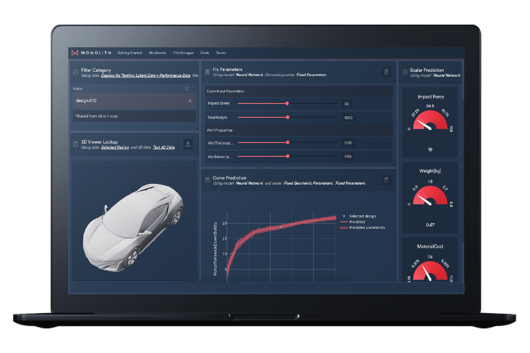Monolith AI software accelerates development of world-class vehicles with data-driven modelling
BMW Group engineers are using pioneering AI technology to solve previously impossible physics challenges from aerodynamics to crash tests with data-driven models and machine learning.
- Engineers at BMW Group are using Monolith AI software and data-driven modelling to predict vehicle performance before design or testing has begun, dramatically accelerating vehicle development.
- The Monolith self-learning models are instantly predicting the performance of highly complex systems like crash and aerodynamics tests through machine learning methods applied to a data-driven model.
- The Monolith platform leverages valuable engineering data and machine learning algorithms to rapidly find critical new insights hidden in historic and current test data.
- Listed by Gartner as a Cool Vendor for AI in Automotive and featured in Forbes magazine, Monolith is used by other globally-renowned engineering teams including Siemens.
- Discover more from Monolith here.
20 June 2022 (11am BST) London, UK – Monolith, an AI software platform used by the world’s leading automotive, aerospace, and industrial engineering teams like Siemens, announced today that engineering teams at the BMW Group, the world’s leading premium manufacturer of automobiles and motorcycles, are using its software to accelerate the development of their world-class vehicles. By training Monolith self-learning and data-driven models with the company’s valuable engineering test data, engineers can now use AI to solve previously impossible physics challenges and instantly predict the performance of highly complex systems like crash and aerodynamics tests.

The BMW Group crash test engineering team began working with Monolith in 2019 via the BMW Startup Garage to explore the potential of using AI and machine learning to predict the force on a passenger’s tibia during a crash. Current crash development uses 1000s of simulations as well as physical tests and training data to capture performance. Even with sophisticated modelling, owing to the complexity of the physics underpinning crash dynamics, results require substantial engineering know-how to calibrate for real-world behaviour. Moreover, physical crash tests can only be conducted in later stages of development when the design is mature enough to create physical prototypes. Exploring a more efficient solution, the BMW Group collaborated with Monolith to see if AI could predict crash performance, and more importantly, substantially earlier in the vehicle development process. The BMW Startup Garage, BMW Group’s venture client unit, facilitated this collaboration and helped Monolith grow its business relations with the premium automotive manufacturer.
Using Monolith, BMW Group engineers built self-learning and data-driven models using the wealth of their existing crash data along with experimental data, and were able to accurately predict the force on the tibia for a range of different crash types without doing physical crashes. Moreover, the accuracy of the self-learning or data-driven models will continue to improve as more input data becomes available and the machine learning platform is further embedded into the engineering workflow. This game-changing approach now means engineers can optimise crash performance earlier in the design process and reduce dependence on time-intensive, costly testing whilst making historical input data infinitely more valuable.
“When the intractable physics of a complex vehicle system means it can’t be truly solved via simulation, AI and self-learning models can fill the gap to instantly understand and predict vehicle performance. This offers engineers a tremendous new tool to do less testing and more learning from their data by reducing the number of required simulations and physical tests while critically making existing data more valuable,” said Dr Richard Ahlfeld, CEO and Founder, Monolith. “We are excited to see how BMW Group engineers are using pioneering technologies like Monolith to reduce the cost and time of product development as they develop the next generation of premium vehicles.”
The Monolith platform has been developed with a laser focus on user experience by automotive experts and data scientists to ensure seamless integration with existing engineering processes. As a result, as soon as the software is implemented, domain experts quickly begin gaining valuable insights and time back, as well as the chance to explore an even wider design space through testing a respective data-driven model.
“What’s perhaps even more exciting than the promise of accelerating the vehicle development process is the opportunity for engineers to explore more design parameters and find new relationships between operating conditions without the need for data science support. Suddenly the combination of engineering expertise and machine learning becomes a competitive game-changer and gives our customers the means to create world-class products more efficiently." Dr Richard Ahlfeld continued.
The BMW Group is expanding its use of Monolith into more engineering functions across R&D that generate vast amounts of experimental data from crash testing to aerodynamics, motorsports, and advanced driver-assist systems (ADAS). Monolith is poised to swiftly scale, propelled by more globally renowned engineering teams adopting Monolith, an expert team, a network of industry partners, and an extensive portfolio of IP.
About Monolith:
Monolith Software is trusted by the world’s top engineering teams including Siemens and BMW Group to develop better quality products in half the time. Backed by one of the world’s largest software investors and recognized by Gartner as a Cool Vendor for AI in Automotive, Monolith AI empowers engineering domain experts in automotive, aerospace, and industrial markets to reduce expensive, time-intensive testing, lower risks to product performance and quality, and cut product development time. Featured in Forbes magazine and named one of the UK’s top 100 start-ups, Monolith AI founder Dr. Richard Ahlfeld received his PhD in Aerospace Engineering from Imperial College and was named to MIT Technology Review’s Top 10 Innovators under 35. Monolith AI is headquartered in London with global enterprise clients worldwide.

